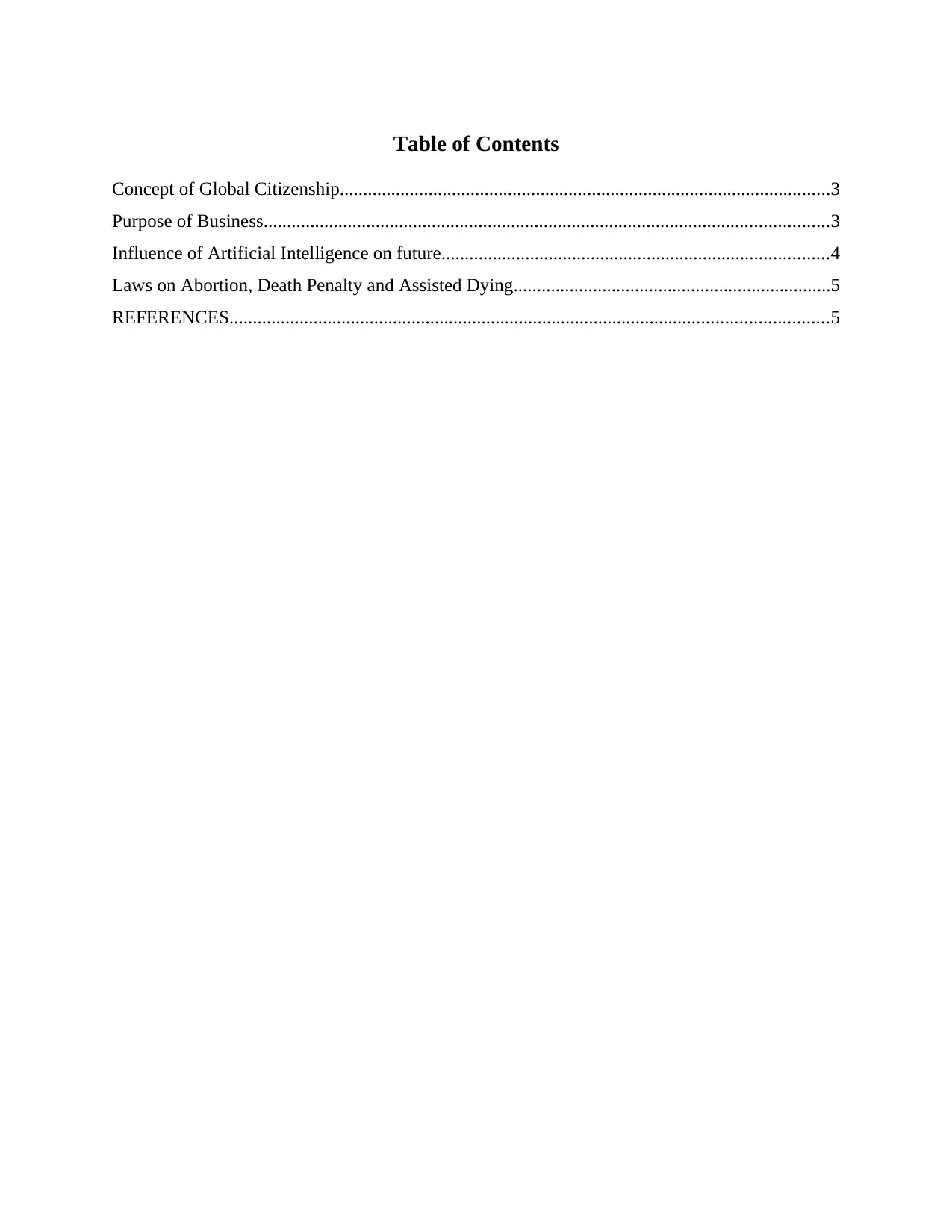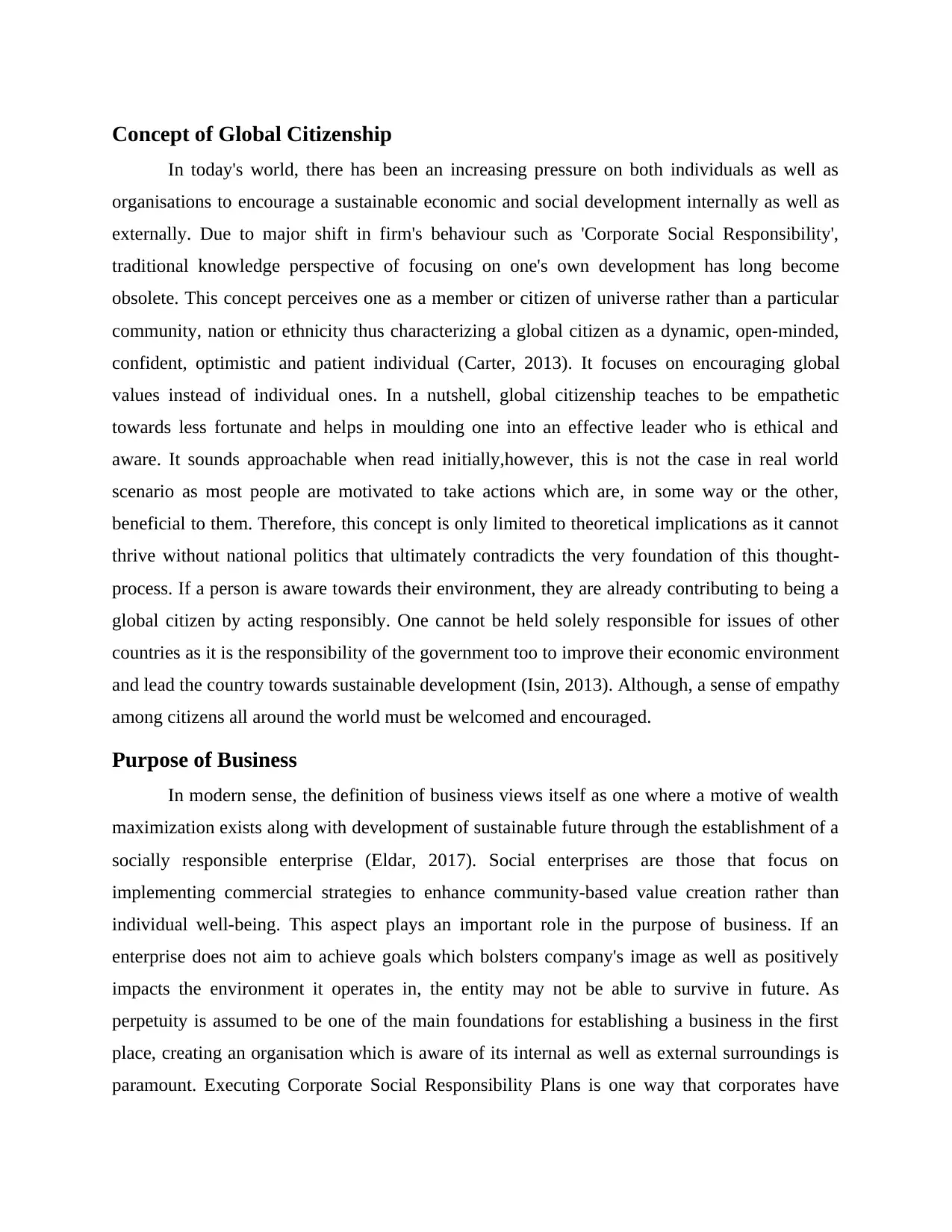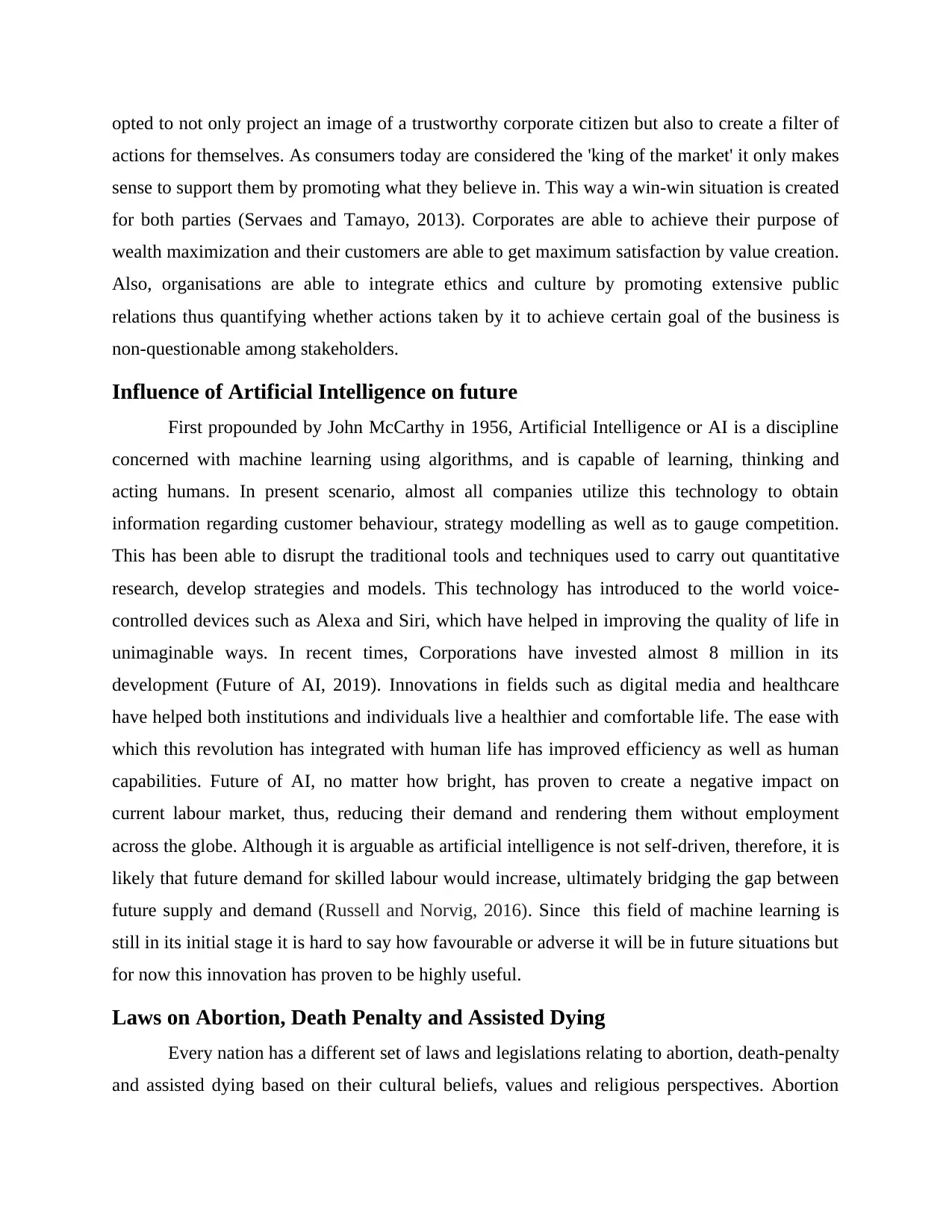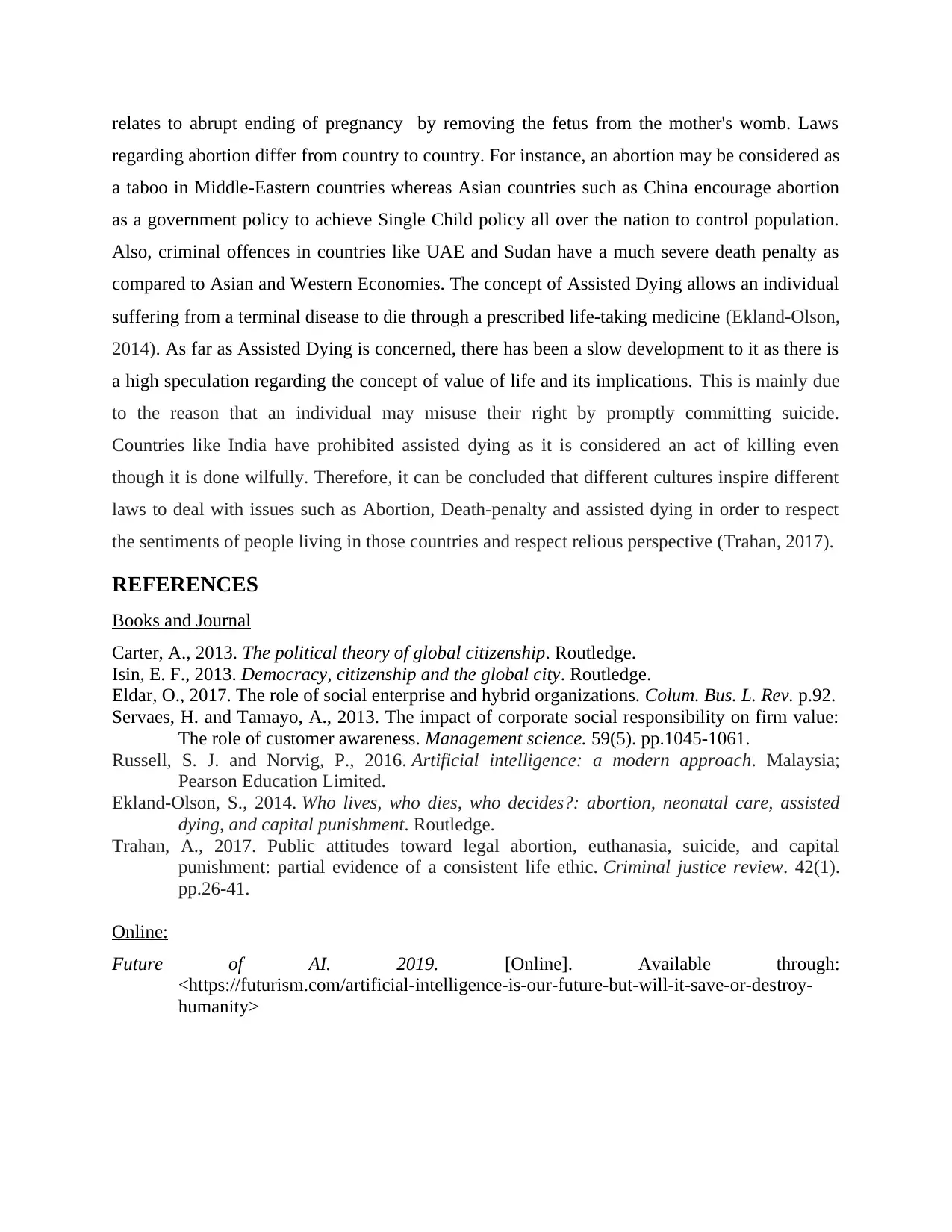Exploring Global Citizenship, Business, AI, and Legal Perspectives
VerifiedAdded on 2020/11/23
|5
|1386
|416
Project
AI Summary
This project delves into several interconnected topics, beginning with the concept of global citizenship, emphasizing the shift from individual to global values and the importance of empathy and ethical leadership, while acknowledging the practical challenges of its implementation. It then examines the purpose of business, highlighting the move towards socially responsible enterprises and the significance of Corporate Social Responsibility (CSR) in wealth maximization and consumer satisfaction. The project further analyzes the influence of Artificial Intelligence (AI) on the future, discussing its impact on various industries, its potential disruption of the labor market, and its overall usefulness. Finally, it explores the varying laws surrounding abortion, the death penalty, and assisted dying across different nations, emphasizing the influence of cultural, religious, and ethical perspectives on these legal frameworks, with references to relevant books, journals and online resources.

PROJECT
Paraphrase This Document
Need a fresh take? Get an instant paraphrase of this document with our AI Paraphraser

Table of Contents
Concept of Global Citizenship.........................................................................................................3
Purpose of Business.........................................................................................................................3
Influence of Artificial Intelligence on future...................................................................................4
Laws on Abortion, Death Penalty and Assisted Dying....................................................................5
REFERENCES................................................................................................................................5
Concept of Global Citizenship.........................................................................................................3
Purpose of Business.........................................................................................................................3
Influence of Artificial Intelligence on future...................................................................................4
Laws on Abortion, Death Penalty and Assisted Dying....................................................................5
REFERENCES................................................................................................................................5

Concept of Global Citizenship
In today's world, there has been an increasing pressure on both individuals as well as
organisations to encourage a sustainable economic and social development internally as well as
externally. Due to major shift in firm's behaviour such as 'Corporate Social Responsibility',
traditional knowledge perspective of focusing on one's own development has long become
obsolete. This concept perceives one as a member or citizen of universe rather than a particular
community, nation or ethnicity thus characterizing a global citizen as a dynamic, open-minded,
confident, optimistic and patient individual (Carter, 2013). It focuses on encouraging global
values instead of individual ones. In a nutshell, global citizenship teaches to be empathetic
towards less fortunate and helps in moulding one into an effective leader who is ethical and
aware. It sounds approachable when read initially,however, this is not the case in real world
scenario as most people are motivated to take actions which are, in some way or the other,
beneficial to them. Therefore, this concept is only limited to theoretical implications as it cannot
thrive without national politics that ultimately contradicts the very foundation of this thought-
process. If a person is aware towards their environment, they are already contributing to being a
global citizen by acting responsibly. One cannot be held solely responsible for issues of other
countries as it is the responsibility of the government too to improve their economic environment
and lead the country towards sustainable development (Isin, 2013). Although, a sense of empathy
among citizens all around the world must be welcomed and encouraged.
Purpose of Business
In modern sense, the definition of business views itself as one where a motive of wealth
maximization exists along with development of sustainable future through the establishment of a
socially responsible enterprise (Eldar, 2017). Social enterprises are those that focus on
implementing commercial strategies to enhance community-based value creation rather than
individual well-being. This aspect plays an important role in the purpose of business. If an
enterprise does not aim to achieve goals which bolsters company's image as well as positively
impacts the environment it operates in, the entity may not be able to survive in future. As
perpetuity is assumed to be one of the main foundations for establishing a business in the first
place, creating an organisation which is aware of its internal as well as external surroundings is
paramount. Executing Corporate Social Responsibility Plans is one way that corporates have
In today's world, there has been an increasing pressure on both individuals as well as
organisations to encourage a sustainable economic and social development internally as well as
externally. Due to major shift in firm's behaviour such as 'Corporate Social Responsibility',
traditional knowledge perspective of focusing on one's own development has long become
obsolete. This concept perceives one as a member or citizen of universe rather than a particular
community, nation or ethnicity thus characterizing a global citizen as a dynamic, open-minded,
confident, optimistic and patient individual (Carter, 2013). It focuses on encouraging global
values instead of individual ones. In a nutshell, global citizenship teaches to be empathetic
towards less fortunate and helps in moulding one into an effective leader who is ethical and
aware. It sounds approachable when read initially,however, this is not the case in real world
scenario as most people are motivated to take actions which are, in some way or the other,
beneficial to them. Therefore, this concept is only limited to theoretical implications as it cannot
thrive without national politics that ultimately contradicts the very foundation of this thought-
process. If a person is aware towards their environment, they are already contributing to being a
global citizen by acting responsibly. One cannot be held solely responsible for issues of other
countries as it is the responsibility of the government too to improve their economic environment
and lead the country towards sustainable development (Isin, 2013). Although, a sense of empathy
among citizens all around the world must be welcomed and encouraged.
Purpose of Business
In modern sense, the definition of business views itself as one where a motive of wealth
maximization exists along with development of sustainable future through the establishment of a
socially responsible enterprise (Eldar, 2017). Social enterprises are those that focus on
implementing commercial strategies to enhance community-based value creation rather than
individual well-being. This aspect plays an important role in the purpose of business. If an
enterprise does not aim to achieve goals which bolsters company's image as well as positively
impacts the environment it operates in, the entity may not be able to survive in future. As
perpetuity is assumed to be one of the main foundations for establishing a business in the first
place, creating an organisation which is aware of its internal as well as external surroundings is
paramount. Executing Corporate Social Responsibility Plans is one way that corporates have
⊘ This is a preview!⊘
Do you want full access?
Subscribe today to unlock all pages.

Trusted by 1+ million students worldwide

opted to not only project an image of a trustworthy corporate citizen but also to create a filter of
actions for themselves. As consumers today are considered the 'king of the market' it only makes
sense to support them by promoting what they believe in. This way a win-win situation is created
for both parties (Servaes and Tamayo, 2013). Corporates are able to achieve their purpose of
wealth maximization and their customers are able to get maximum satisfaction by value creation.
Also, organisations are able to integrate ethics and culture by promoting extensive public
relations thus quantifying whether actions taken by it to achieve certain goal of the business is
non-questionable among stakeholders.
Influence of Artificial Intelligence on future
First propounded by John McCarthy in 1956, Artificial Intelligence or AI is a discipline
concerned with machine learning using algorithms, and is capable of learning, thinking and
acting humans. In present scenario, almost all companies utilize this technology to obtain
information regarding customer behaviour, strategy modelling as well as to gauge competition.
This has been able to disrupt the traditional tools and techniques used to carry out quantitative
research, develop strategies and models. This technology has introduced to the world voice-
controlled devices such as Alexa and Siri, which have helped in improving the quality of life in
unimaginable ways. In recent times, Corporations have invested almost 8 million in its
development (Future of AI, 2019). Innovations in fields such as digital media and healthcare
have helped both institutions and individuals live a healthier and comfortable life. The ease with
which this revolution has integrated with human life has improved efficiency as well as human
capabilities. Future of AI, no matter how bright, has proven to create a negative impact on
current labour market, thus, reducing their demand and rendering them without employment
across the globe. Although it is arguable as artificial intelligence is not self-driven, therefore, it is
likely that future demand for skilled labour would increase, ultimately bridging the gap between
future supply and demand (Russell and Norvig, 2016). Since this field of machine learning is
still in its initial stage it is hard to say how favourable or adverse it will be in future situations but
for now this innovation has proven to be highly useful.
Laws on Abortion, Death Penalty and Assisted Dying
Every nation has a different set of laws and legislations relating to abortion, death-penalty
and assisted dying based on their cultural beliefs, values and religious perspectives. Abortion
actions for themselves. As consumers today are considered the 'king of the market' it only makes
sense to support them by promoting what they believe in. This way a win-win situation is created
for both parties (Servaes and Tamayo, 2013). Corporates are able to achieve their purpose of
wealth maximization and their customers are able to get maximum satisfaction by value creation.
Also, organisations are able to integrate ethics and culture by promoting extensive public
relations thus quantifying whether actions taken by it to achieve certain goal of the business is
non-questionable among stakeholders.
Influence of Artificial Intelligence on future
First propounded by John McCarthy in 1956, Artificial Intelligence or AI is a discipline
concerned with machine learning using algorithms, and is capable of learning, thinking and
acting humans. In present scenario, almost all companies utilize this technology to obtain
information regarding customer behaviour, strategy modelling as well as to gauge competition.
This has been able to disrupt the traditional tools and techniques used to carry out quantitative
research, develop strategies and models. This technology has introduced to the world voice-
controlled devices such as Alexa and Siri, which have helped in improving the quality of life in
unimaginable ways. In recent times, Corporations have invested almost 8 million in its
development (Future of AI, 2019). Innovations in fields such as digital media and healthcare
have helped both institutions and individuals live a healthier and comfortable life. The ease with
which this revolution has integrated with human life has improved efficiency as well as human
capabilities. Future of AI, no matter how bright, has proven to create a negative impact on
current labour market, thus, reducing their demand and rendering them without employment
across the globe. Although it is arguable as artificial intelligence is not self-driven, therefore, it is
likely that future demand for skilled labour would increase, ultimately bridging the gap between
future supply and demand (Russell and Norvig, 2016). Since this field of machine learning is
still in its initial stage it is hard to say how favourable or adverse it will be in future situations but
for now this innovation has proven to be highly useful.
Laws on Abortion, Death Penalty and Assisted Dying
Every nation has a different set of laws and legislations relating to abortion, death-penalty
and assisted dying based on their cultural beliefs, values and religious perspectives. Abortion
Paraphrase This Document
Need a fresh take? Get an instant paraphrase of this document with our AI Paraphraser

relates to abrupt ending of pregnancy by removing the fetus from the mother's womb. Laws
regarding abortion differ from country to country. For instance, an abortion may be considered as
a taboo in Middle-Eastern countries whereas Asian countries such as China encourage abortion
as a government policy to achieve Single Child policy all over the nation to control population.
Also, criminal offences in countries like UAE and Sudan have a much severe death penalty as
compared to Asian and Western Economies. The concept of Assisted Dying allows an individual
suffering from a terminal disease to die through a prescribed life-taking medicine (Ekland-Olson,
2014). As far as Assisted Dying is concerned, there has been a slow development to it as there is
a high speculation regarding the concept of value of life and its implications. This is mainly due
to the reason that an individual may misuse their right by promptly committing suicide.
Countries like India have prohibited assisted dying as it is considered an act of killing even
though it is done wilfully. Therefore, it can be concluded that different cultures inspire different
laws to deal with issues such as Abortion, Death-penalty and assisted dying in order to respect
the sentiments of people living in those countries and respect relious perspective (Trahan, 2017).
REFERENCES
Books and Journal
Carter, A., 2013. The political theory of global citizenship. Routledge.
Isin, E. F., 2013. Democracy, citizenship and the global city. Routledge.
Eldar, O., 2017. The role of social enterprise and hybrid organizations. Colum. Bus. L. Rev. p.92.
Servaes, H. and Tamayo, A., 2013. The impact of corporate social responsibility on firm value:
The role of customer awareness. Management science. 59(5). pp.1045-1061.
Russell, S. J. and Norvig, P., 2016. Artificial intelligence: a modern approach. Malaysia;
Pearson Education Limited.
Ekland-Olson, S., 2014. Who lives, who dies, who decides?: abortion, neonatal care, assisted
dying, and capital punishment. Routledge.
Trahan, A., 2017. Public attitudes toward legal abortion, euthanasia, suicide, and capital
punishment: partial evidence of a consistent life ethic. Criminal justice review. 42(1).
pp.26-41.
Online:
Future of AI. 2019. [Online]. Available through:
<https://futurism.com/artificial-intelligence-is-our-future-but-will-it-save-or-destroy-
humanity>
regarding abortion differ from country to country. For instance, an abortion may be considered as
a taboo in Middle-Eastern countries whereas Asian countries such as China encourage abortion
as a government policy to achieve Single Child policy all over the nation to control population.
Also, criminal offences in countries like UAE and Sudan have a much severe death penalty as
compared to Asian and Western Economies. The concept of Assisted Dying allows an individual
suffering from a terminal disease to die through a prescribed life-taking medicine (Ekland-Olson,
2014). As far as Assisted Dying is concerned, there has been a slow development to it as there is
a high speculation regarding the concept of value of life and its implications. This is mainly due
to the reason that an individual may misuse their right by promptly committing suicide.
Countries like India have prohibited assisted dying as it is considered an act of killing even
though it is done wilfully. Therefore, it can be concluded that different cultures inspire different
laws to deal with issues such as Abortion, Death-penalty and assisted dying in order to respect
the sentiments of people living in those countries and respect relious perspective (Trahan, 2017).
REFERENCES
Books and Journal
Carter, A., 2013. The political theory of global citizenship. Routledge.
Isin, E. F., 2013. Democracy, citizenship and the global city. Routledge.
Eldar, O., 2017. The role of social enterprise and hybrid organizations. Colum. Bus. L. Rev. p.92.
Servaes, H. and Tamayo, A., 2013. The impact of corporate social responsibility on firm value:
The role of customer awareness. Management science. 59(5). pp.1045-1061.
Russell, S. J. and Norvig, P., 2016. Artificial intelligence: a modern approach. Malaysia;
Pearson Education Limited.
Ekland-Olson, S., 2014. Who lives, who dies, who decides?: abortion, neonatal care, assisted
dying, and capital punishment. Routledge.
Trahan, A., 2017. Public attitudes toward legal abortion, euthanasia, suicide, and capital
punishment: partial evidence of a consistent life ethic. Criminal justice review. 42(1).
pp.26-41.
Online:
Future of AI. 2019. [Online]. Available through:
<https://futurism.com/artificial-intelligence-is-our-future-but-will-it-save-or-destroy-
humanity>
1 out of 5
Related Documents
Your All-in-One AI-Powered Toolkit for Academic Success.
+13062052269
info@desklib.com
Available 24*7 on WhatsApp / Email
![[object Object]](/_next/static/media/star-bottom.7253800d.svg)
Unlock your academic potential
Copyright © 2020–2026 A2Z Services. All Rights Reserved. Developed and managed by ZUCOL.





